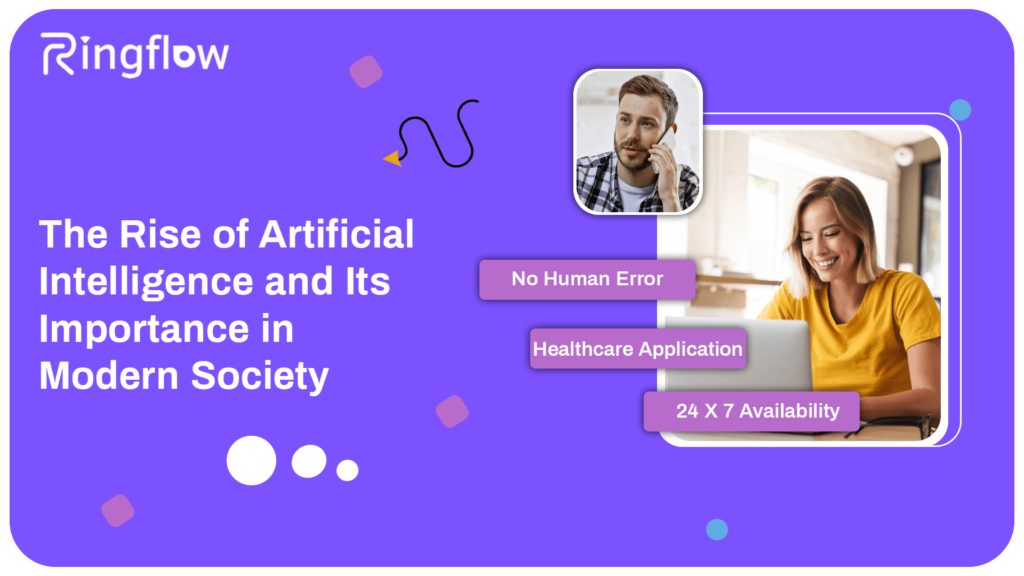The Rise of Artificial Intelligence and Its Importance in Modern Society
Artificial Intelligence (AI) is a rapidly expanding field, transforming our lives and shaping the future of technology as we know it. At its core, AI refers to machines that can learn from experience and perform tasks that require human-like intelligence. AI has become integral to modern society, from powering virtual assistants like Siri and Alexa to improving healthcare outcomes.
What is Artificial Intelligence?
Artificial Intelligence, or AI in short, refers to the ability of machines to perform tasks that typically require human intelligence. These tasks could range from simple ones like recognizing speech commands or identifying objects in a picture, to more complex ones like playing chess or driving cars. AI systems use algorithms and data to “learn” from examples and improve their performance over time.
An Explanation of Artificial Intelligence
Despite the growing popularity of AI, many people still have misconceptions about what it entails. Simply put, artificial intelligence refers to machines that can simulate human-like intelligence by performing tasks such as speech recognition, decision-making, language translation and more. Depending on their specific capabilities, AI systems can be broken down into two main types – narrow or general. Narrow or weak AI is designed for a single task or purpose while general or strong AI can perform multiple tasks simultaneously with human-level intelligence.
RingFlow’s Involvement in Artificial Intelligence
RingFlow is a leading technology company at the forefront of innovative solutions for businesses across different industries. With its expertise in cloud-based software development and IoT solutions, RingFlow has played an important role in developing cutting-edge technologies based on artificial intelligence. Ringflow’s involvement in artificial intelligence spans various industries such as healthcare and manufacturing transportation. By leveraging cutting-edge ML and deep learning algorithms, Ringflow has created AI-powered solutions that have transformed businesses’ operations.
The Importance of RingFlow’s AI Technology
RingFlow’s AI technology has been instrumental in driving innovation and efficiency across different sectors of the economy. Their machine learning algorithms in healthcare can help doctors diagnose diseases more accurately while reducing costs. In manufacturing, they have developed solutions that enable factories to optimize their production processes and minimize downtime. In transportation, RingFlow’s AI-powered systems can monitor traffic patterns and predict accidents before they occur; reducing congestion on roads, and increasing safety for drivers and passengers alike.
Types of AI (Narrow vs General)
There are two main types of AI: Narrow AI and General AI. Narrow AI refers to systems designed to perform specific tasks such as language translation or facial recognition. These systems are trained with vast amounts of data and machine learning techniques, allowing them to make highly accurate predictions or decisions within their specific domain. On the other hand, General AI aims at creating machines capable of performing any intellectual task just like humans do. This type of AI would require an algorithm capable of learning from experience in a wide range of subjects instead of a single task-oriented algorithm.
Examples of AI in everyday life
AI is already an integral part of our daily lives, even if we don’t always realize it. From virtual assistants like Siri and Alexa to personalized recommendations on social media platforms and streaming services like Netflix, we rely on sophisticated algorithms powered by machine learning daily. Another example is autonomous vehicles such as Tesla’s self-driving cars, which use various sensors and complex algorithms powered by artificial intelligence frameworks such as Tensorflow to detect obstacles around the car while driving. AI-powered medical diagnosis systems that can analyze medical images like X-rays and MRI scans, and identify potential health risks are becoming increasingly common.
How Does AI Work?
Artificial Intelligence is a complex field involving various techniques and approaches to enable machines to simulate human intelligence. The most common techniques used in AI include Machine Learning, Deep Learning, Natural Language Processing (NLP), and Neural Networks.
Machine Learning
Machine Learning (ML) is a subset of AI that allows systems to learn and improve over time without being explicitly programmed. This is achieved through the use of algorithms that analyze large amounts of data and identify patterns or trends within it. These algorithms can use the patterns identified to make predictions or decisions on new data sets.
Deep Learning
Deep Learning (DL) is an advanced form of Machine Learning that relies on artificial neural networks with multiple layers. These networks are designed to model how neurons work in the human brain, allowing them to recognize patterns in data at an unprecedented level of accuracy. DL has been successful in several areas such as speech recognition, image classification, and natural language processing.
Natural Language Processing (NLP)
Natural Language Processing (NLP) is a subfield of AI dedicated to helping computers understand human language. This includes speech recognition, sentiment analysis, machine translation, and text-to-speech technology. NLP enables machines to process and analyze vast amounts of textual data accurately.
Applications of Artificial Intelligence
Healthcare: The AI Revolutionizing Modern Medicine
One of the most exciting applications of AI is in healthcare. AI-powered systems can analyze vast amounts of medical data and help doctors make more accurate diagnoses, create personalized treatment plans, and monitor patient health in real time.
This allows doctors to take preventative measures before a disease progresses to a dangerous stage. Additionally, AI-based imaging systems allow for faster and more accurate analysis of medical images such as X-rays and MRIs.
Manufacturing: Increasing Efficiency with Smart Factories
Another industry where AI is making a big impact is manufacturing. Manufacturers can dramatically improve production efficiency while reducing costs by implementing smart factories that use sensors, robots, and advanced analytics. These systems use machine learning algorithms to optimize production schedules based on real-time data such as customer demand, inventory levels, and machine performance.
Transportation: From Self-driving Cars to Traffic Optimization
AI is also revolutionizing transportation by creating new opportunities for automation and optimization. Self-driving cars are just one example; of using sensors and machine learning algorithms to navigate roads safely and efficiently. However, even without fully autonomous vehicles on the road yet, AI-based traffic optimization systems are already helping reduce congestion in many cities.
Customer Service: Enhancing Support with Chatbots
Customer service is another area where we’re seeing the benefits of artificial intelligence. Many companies are using chatbots powered by natural language processing (NLP) to provide 24/7 support services for their customers. These chatbots can handle basic inquiries such as tracking orders or resetting passwords much faster than human representatives could manage alone – freeing up staff members to focus on more complex issues requiring human intervention. Overall, Artificial Intelligence has vast applications across industries. From healthcare to transportation, AI-powered systems transform how we live and work.
Ringflow’s Contribution to the Development of Artificial Intelligence
Explanation of how Ringflow uses Machine Learning, Deep Learning, and NLP to create innovative solutions
Machine Learning is a type of AI that allows computers to learn from data without explicit programming. Ringflow uses this technology to analyze large datasets and develop models that can make predictions or provide customer insights into a particular problem.
Deep Learning is a subset of machine learning involving multiple layers of artificial neural networks. Ringflow uses deep learning techniques for image recognition tasks, natural language processing (NLP), speech recognition, and many others.
Challenges and Ethical Concerns with Artificial Intelligence
The Potential Negative Impact on Employment Opportunities
One of the biggest challenges with AI is its potential impact on employment opportunities. With the increasing use of automation and AI-powered systems in various industries, there is a fear that many jobs will become obsolete. For example, self-driving cars could replace human drivers, and automated manufacturing systems could replace factory workers.
While this may increase efficiency and productivity in certain industries, it also threatens many people’s livelihoods. It’s important for companies to consider ways to use AI technology while also ensuring that their employees are not left without job opportunities.




